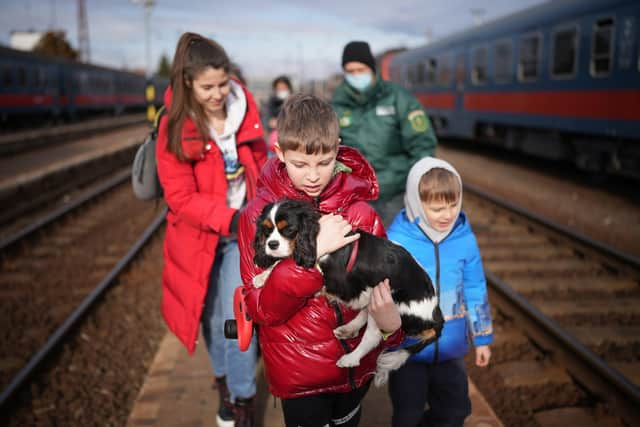Northern Ireland Presbyterians respond generously to help support Ukrainian refugees
and live on Freeview channel 276
Following an initial highly generous gesture of a £60,000 donation from the Presbyterian moderator the Rev David Bruce’s appeal fund, many congregations across the province have responded with local initiatives aimed at sustaining the humanitarian response necessary to meet the needs of refugees on the Polish, Moldovian and Hungarian borders with Ukraine.
The Presbyterian financial and material response is being channelled through the church’s charitable partners Tearfund and Christian Aid.
Advertisement
Hide AdAdvertisement
Hide AdBut it is also being sent to Hungarian Reformed Church Aid (HRCA), the relief and development wing of the Reformed Church in Hungary, a denomination with which Irish Presbyterianism has strong and historic links.


Hungary shares a 100-mile border with Ukraine and it is in that region that thousands of refugees from the war have located.
According to the Rev Uel Marrs, secretary to the Irish Presbyterian Church’s council for global mission,the HRCA network has a staff of 50 and nearly 2,000 volunteers working assiduously on the ground, including 12 doctors and 80 interpreters.
“They are providing much-needed help regardless of the race, gender, religion or political affiliation of those most in need,” says Mr Marrs, speaking in the Presbyterian Herald.
Advertisement
Hide AdAdvertisement
Hide Ad“Aid comes in the form of food, hygiene, kits, warm clothing, accommodation, transportation, spiritual support and even toys for the children. Humanitarian aid has not only been committed to refugees, but extended to those remaining in Ukraine, including the internally displaced who have fled to the west of the country,” adds Mr Marrs, who is in direct daily contact with church sources on the Hungarian/Ukrainian border.
Irish Presbyterian church leaders have been encouraged with the response from congregations within their own denomination.
There is a synod of the Hungarian Reformed Church located at Transcarpathia in west Ukraine. Prior to the Russian invasion, the Trancarpathian church district had 120,000 members, worshipping in 120 thriving congregations.
Through the decades of the Soviet ccommunist regime, this Hungarian-speaking church endured much suffering. In Stalin’s time in Moscow in the 1930-50s, 30,000 Hungarian men from this region were transported to Siberia, never to return home.
Advertisement
Hide AdAdvertisement
Hide AdSurvival of this besieged community now remains their prime objective and Bishop Sandor Zan-Fabian, leader of the Transcarphian church district, has issued a pastoral letter to the synod’s ministers advising them to “stay in your place, remain where you are.”.
The bishop underlines the importance of continuing to gather, to pray and to share the Christian Reformed gospel. He reminds his flock of their responsibilities to be steadfast and patiently care for the sick, the elderly and those arriving in great need from war-ravaged eastern Ukraine.